Pam Lecky's Blog, page 32
January 23, 2017
A Conversation with Author Meghan Holloway
[image error]Today in the Library we have Meghan Holloway, who has dropped in to say hello and to share some insights into her life as an author.
You are very welcome, Meghan, please introduce yourself:
“My dearest darling …” That was how my grandfather began all of his letters to my grandmother while he was stationed in Okinawa in World War II. I never knew my grandfather, but I’ve poured over his letters. I used to draw lines up the back of my legs, just as my grandmother had as a young woman whose nylons had been donated to make parachutes, and I’ve endlessly pestered my paternal grandfather for stories of his childhood and service. The worn letters and patiently-told stories cemented my interest in history, especially in the WWII era.
I found my first Nancy Drew mystery in a sun-dappled attic at a friend’s house and subsequently fell in love with the grip and tautness of a well-told mystery. I flew an airplane before I learned how to drive a car, did my undergrad work in a crumbling once-all girls school in the sweltering south, spent a summer and fall in Maine picking peaches and apples, finished my graduate work in an all-girls school in the blustery north, and traveled the world for a few years. Now I’m settled down in the foothills of the Appalachians, writing my third and fourth novels, and hanging out with my standard poodle.
Did you read much as a child? Are you an avid reader now? Do you prefer books in your own genre or are you happy to explore others?
Some of my earliest memories are of reading. Learning how to read wasn’t difficult for me, and I remember the wonder of those first days of reading. I’ve always felt that there is a magic to the written word and a brilliant enchantment to reading: I was able to breach time and continents and worlds in books. I’ve carried that love with me into adulthood, and reading is still one of my favorite pastimes. I’m an eclectic reader; I don’t stick with a single genre. I will say, though, that even though my current work in progress is set in World War II, much of the literature I read about the era is nonfiction rather than fiction.
Are you self-published or traditionally published?
I have two novels out under a pseudonym that were traditionally published, and I imagine I will follow the same course with my work in progress.
Which genre do you write in and why?
I began my writing career in the romantic suspense genre. I cut my reading teeth on Nancy Drew, Trixie Belden, the Hardy Boys, and the Bobbsey Twins, so I have long thought mysteries to be a great tool for exploring human nature and psyche. Adding that additional layer of emotion with the romantic element grew naturally from the stories.
Historical fiction has long been my passion, though, and my current work in progress, as well as the stories I have lined up next, all fall within the genre. I’ve always loved studying history, but many history tomes are dry, dusty reads that give no glimpse of the humanity involved in the events of the past. They tell the facts but not the story. And there is always a story. Historical fiction allows both the author and the reader to step through time and become engrossed in the stories of different eras.
Who has been the biggest influence on your writing?
I’ve always loved C.S. Lewis’s words from An Experiment in Criticism:
“But in reading great literature I become a thousand men and yet remain myself. Like the night sky in the Greek poem, I see with a myriad eyes, but it is still I who see. Here, as in worship, in love, in moral action, and in knowing, I transcend myself; and am never more myself than when I do.”
Since reading that passage years ago, I’ve kept that kernel of truth in mind both as a reader and a writer, so in that regard, C.S. Lewis has influenced my writing.
Mary Stewart has probably been the biggest influence on my writing, though. I came across her books at a young age, and she has always been one of my favorite authors. She was a pioneer in her genre, and her work was both erudite and vivid: the detailed settings, the classic heroines, the subtlety of the romance, and the suspense. I wrote her a letter about ten years ago and received a beautiful handwritten response that I still have framed.
Has your country of origin/culture influenced your writing?
I think our roots always influence us. Our countries and cultures help shape our worldviews, which influences the way we think, the values we hold, the stories we want to hear and want to tell.
What part of the writing process do you find most difficult? How do you overcome it?
For me, the most difficult aspect of writing is getting that first draft on paper. It’s not really an issue of writer’s block or a fickle muse, but more of an issue of research and being a perfectionist. I don’t like to start writing in a period until I feel like I have accumulated all possible knowledge of an era, which of course isn’t entirely possible. I have to remind myself that even the experts don’t know everything about everything. I overcome it by setting pen to paper—I always write in longhand—and making notes to myself as I go along about what I feel needs more research.
Do you have a favourite time of day to write?
I don’t think I do have a favorite time of day to write. I can write anywhere and anytime, as long as it’s quiet.
What is the best thing about being an author? And the flipside – what is the worst?
I think the best and worst aspects of being an author are two sides of the same coin. On the one side, you’re able to make all of these connections with fellow authors, bloggers, readers, and researchers. It’s a profession in which the world is connected through the pages one writes. But on the other side, the craft itself is a solitary labor. A labor of love, but an isolating one, and I think most authors feel that dual nature of connectivity and loneliness.
Is social media an essential chore or something you enjoy? Which forum do you prefer?
I’ve come to think of social media—my preference is Facebook—as an enjoyable tool. It’s very much a marketing tool that can be used very effectively to connect with fellow authors and readers, and those connections are what make the tool so enjoyable.
If you weren’t an author, what would you be up to?
My graduate work was in library and information science, so when I’m not behind my desk, I’m quite at home in a library, archive, or museum. I love storehouses of knowledge and have always gravitated toward such work. I interned at a nature and science museum while working on my masters, and it was there that I fell in love with paleontology. I would take my lunch breaks in the bone room while working there, so if I weren’t writing, weren’t working in the field I’m in now, I believe I’d enjoy spending my days caring for the bones of creatures long since gone from earth.
It’s the last day and the earth is facing oblivion – what book would you read?
I’d read a book on how to stop the coming oblivion. My reading and writing list is too long for the world to end.
Please tell us what you are working on at the moment.
My current work in progress is about a Welsh sheep farmer who is a veteran of World War One and whose son is a conscientious objector in WWII. After the Somme, my protagonist swore he would never set foot in France again, but after almost three decades, he’s forced to renege on that vow to save the son he thought lost to him.
If you would like to know more about Meghan and her work, please click on the social media links below:
If you are interested in Meghan’s books, please click on the image below:


January 14, 2017
A Conversation with Author Fiona Cooke Hogan
Today I am pleased to introduce my guest, fellow Irish multi-genre author, Fiona Cooke Hogan, who has dropped in to say hello and to share some insights into her life as an author.
You are very welcome, Fiona, please introduce yourself.
[image error]Hello, I’m delighted to be here. I’m a writer, poet and blogger living in Abbeyleix, a quaint little town in the midlands of Ireland. I have been writing since a child and self-published my first collection of short stories in October 2015.
Did you read much as a child? Are you an avid reader now? Do you prefer books in your own genre or are you happy to explore others?
Books were a huge part of my childhood and for years I dreamed of owning a bookshop and I fancied the idea of scribbling away whilst selling and reading the works of others. It may still come to pass. I hoard books and re-read my favourites at least once a year. With eclectic tastes – I devour the classics, crime, supernatural, horror, young adult, faerie tales and sci-fi. My favourites being of the gothic genre.
Are you self-published or traditionally published?
I have self-published a book of short stories on Amazon along with two novellas. I am presently looking for an agent for my current novel – Martha’s Cottage. I’m interested in seeing how the process differs from self-publishing.
Which genre do you write in and why?
This question really ties my answer with the next one. I’m greedy, I can’t choose. My short stories are mixed genre – going from romantic comedy, supernatural and horror to humorous contemporary tales and my first novel is romantic comedy. My work in progress is a psychological thriller. But my favourite genre has got to be gothic horror.
Who has been the biggest influence on your writing?
I grew up on Stoker, Le Fanu, Lovecraft and Poe. I also devoured the Brontes, Jane Austen and Thomas Hardy; where the period they were written and the setting were as much characters as the protagonists. My stories often have a strangeness, a fey quality and a twist in the tale.
Has your country of origin/culture influenced your writing?
I was born in England but moved with my family when I was a child. We lived in George Eliot country and I was dragged around ancient ruins and roman roads from a young age so I have a yearning for the past. I also lived in London for a time and my experiences have definitely coloured my tales. But living in Ireland as long as I have, and considering myself Irish, I’m told that my work is nuanced and has an Irish flavour.
What part of the writing process do you find most difficult? How do you overcome it?
It used to be not recognising the fact that I had to write constantly, that it was a need. I spent years dreaming of writing but not doing much in the way of creating, apart from the odd poem or story. Belief in oneself and one’s abilities is a large obstacle in the way of the writer. Overcome that and you can do anything.
Do you have a favourite time of day to write?
Not particularly. Morning is good when the children are in school but I often write into the early hours.
What is the best thing about being an author? And the flipside – what is the worst?
The best thing is seeing your work in the hands of someone else, getting great feedback and reviews. Most of all knowing that you are doing what you were born to do and not hiding behind your dreams. It took me all my life to come to this point.
The worst thing is how I feel if I’m not writing, like I haven’t finished my homework. It nags and nags and I actually feel quite depressed if I don’t put something down. Completing a chapter is actually a huge buzz.
Is social media an essential chore or something you enjoy? Which forum do you prefer?
It can be a pain, definitely, the “having to” aspect of promotion. I’d rather spend the time online interacting with other authors, to be honest. The support I have found online is unbelievable. I love twitter, it’s such a great promotional tool.
If you weren’t an author, what would you be up to?
In my youth I fancied the idea of being a torch singer – I even went so far as to advertise for back up musicians then bottled it at the last minute. I have the voice but suffer from nerves. However now that I’m learning guitar maybe I could use it to hide behind.
It’s the last day and the earth is facing oblivion – what book would you read?
Easy, The Lord of The Rings by JRR Tolkien.
Please tell us what you are working on and your latest published work.
I am currently working on a psychological thriller/horror set in The South Downs, England that moves between the present and the late Victorian period. I’m two thirds of the way through the first rough draft and it is I have to say, putting up a good fight.
My other work includes: (Click on the image for Amazon)
[image error] [image error] [image error]
If you would like to know more about Fiona and her work check out her links below:
Twitter: @cookehogan
Blog http://www.unusualfiction.wordpress.com
And her author page http://www.facebook.com/theHazelHedge


January 8, 2017
A Conversation with Author Rowan Scot-Ryder
Today in the Library we have Rowan Scot-Ryder, who has dropped in to say hello and to share some insights into her life as an author.
You are very welcome, Rowan, please introduce yourself:
[image error]Hi and thanks for inviting me here. I’m a full-time writer now, but I swim and paint, and sometimes still teach creative writing. I’ve lived and worked all over Britain from the north of Scotland down to the South-East, just outside London, as a nurse, a freelance journalist, and a teacher. I also worked for some years as a guest lecturer on board cruise ships, teaching watercolour painting.
Which genre do you write in and why?
I write fantasy, with as solid a historical base as I can. For me, the world is endlessly fascinating, but its depth lies in being more than simply factual and material.
I was brought up to explore and question, and I’m sure that we are more than the sum of our parts. Perhaps the hidden and unexplained can lead us to a deeper understanding of ourselves in the world.
Did you read much as a child? Are you an avid reader now? Do you prefer books in your own genre or are you happy to explore others?
I have always been an avid reader. I think reading is key in developing our own writing. If a book can take me somewhere else and make the characters live for me, I want to examine why, and explore the skill of good writing. But if something annoys me, it loses me as a reader – and I keep a mental list of ‘don’ts’ that will alienate others.
My own genre has so many pitfalls. I love good fantasy, but some books just rely on fanciful names and sword-wielding maidens. That doesn’t work for me. I prefer my fantasy to have believable, well-researched settings and characters that I can relate to.
Good crime, thrillers and science fiction are also on my weekly reading list.
Are you self-published or traditionally published?
I’m traditionally published. I’m sure I would have self-published if I had not been lucky enough to find my publisher, Rebecca, because we all need to find an outlet eventually. A good editor helps to weed out the mistakes that we make, refines our skills and improves our writing.
My early articles and short stories were published in various magazines and sometimes won small prizes. They were all part of a progression and the learning curve. One or two developed into much longer work.
Who has been the biggest influence on your writing?
That’s a difficult question! We are influenced by so many people, at different times. I don’t think that biggest influences are always other authors. I love Jodie Taylor, but don’t try to copy her. Orson Scott Card has never disappointed me, and yet many great writers have, at some time.
Certainly I had teachers at school who helped me to grow, and I loved to listen to older people’s stories when I was a nurse.
My grandparents were really my greatest influences, in different ways. My family and their personal history made me very curious about perceptions and motivations. My grandmother was very much a woman who understood and respected the earth. Like others in my family, she read the cards and saw spirits. My grandfather, a sailor, not only gave me a wealth of tales, but also explored them with me. We used to play a game of story-telling but the point was always to make sure that every single fact supported the others, wasn’t superfluous and didn’t contradict.
Has your country of origin/culture influenced your writing?
Very much so. I feel a deep affinity with my ancestry and the stories that formed my childhood. Place has its own spirit and character, which is more than just description. To know and love a place means that we do not need to list its features. To think of a place as a character allows it to speak and act upon the characters.
What part of the writing process do you find most difficult? How do you overcome it?
I always know what the story is about, and usually know the end. Because my original discipline is the short story – where we always work towards the end – the ending is vital.
But how does the story unfold, without tripping up or contradicting itself? I find that characters have their own strengths and determine what they want to say and do. They can’t be forced to act against their nature. So one challenge is to ensure character and plot validity.
Beginnings are just that – places to begin. The first beginning I write is rarely the one finally used. It’s a place to start, and better beginnings develop as the story unfolds.
Do you have a favourite time of day to write?
I would love to be a morning writer, but the trouble is that I want to do everything else in the morning too! Evenings, when I can sit back and relax, are my most productive time.
What is the best thing about being an author? And the flipside – what is the worst?
The best thing is living the way I’ve always wanted to. I can’ t think of a really bad side.
Feelings change. Before I had a full-length novel published, one book was all I wanted, although I had twenty years of successful short stories. After one book published, succeeding again was a worry. And so on. But worry is counter-productive and something to be ignored.
Is social media an essential chore or something you enjoy? Which forum do you prefer?
Facebook is a way of speaking to friends. Writing is solitary, and authors need other people. Sadly, the world has become ugly in so many ways, lately, and now Facebook reflects that. I don’t believe that authors should never post anything political or controversial. My own view of writing is that it allows us to see ourselves in relation to the world. Facebook has many faults, but it is part of our world.
If you weren’t an author, what would you be up to?
I enjoyed all the jobs I’ve had. But I would probably paint!
It’s the last day and the earth is facing oblivion – what book would you read?
I might not read at all. A novel (however loved) might be something I could not finish in a limited time. The sky is always good to watch.
A big coffee table book of Van Gogh prints would meet my needs on the last day. Or an old book of Quaker anecdotes. Or my ancient copy of ‘the Water Babies’.
But equally, I could paint, and I might even write.
– After all, the story of the day doesn’t necessarily end as we expect!
Please tell us about your latest published work.
[image error]Earlier this year my novel Daughter of Pendle was published.
Known for centuries as the child of witches, Jennet Devize spoke against her whole family at the Lancaster Assizes in 1612, condemning them all to death. What was the truth behind her betrayal? What happened after the trials? Could she build a life and be loved, become a mother and a healer, or would the accusation of witchcraft follow her forever?
Jennet’s story is close to my heart. It is one I grew up with. But my own fascination with Jennet does not end in 1612. Twenty years later, she was again among those accused of witchcraft, and ‘Daughter of Pendle’ follows her there. I am now working hard on a sequel. Daughter of Pendle is available on Amazon.
If you would like to know more about Rowan and her work please check out the links below:
www.rowanscot-ryder.com Facebook


January 3, 2017
The Bowes Inheritance
A lovely amalgamation of suspense and Victorian romance, Pam Lecky’s The Bowes Inheritance begins with a gentle, Austenian air and soon turns much darker. Lecky brings the late nineteenth century to life on the page in an atmospheric tale filled with memorable characters and unexpected plot twists. Filled with humor, cultural conflicts, heart, and poignancy, The Bowes Inheritance is an engaging read and a brilliant debut.
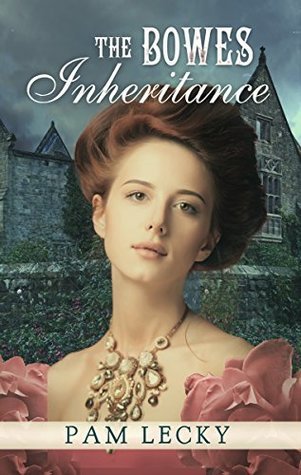 Dublin 1882: When determined but impoverished Louisa Campbell inherits a large estate in the north of England, from an uncle she didn’t even know existed, it appears to be the answer to her prayers. Her younger sister, Eleanor, is gravely ill, and believing that the country air will benefit her, they decide to take up residence at Bowes Farm, situated on the Cumberland coast.
Dublin 1882: When determined but impoverished Louisa Campbell inherits a large estate in the north of England, from an uncle she didn’t even know existed, it appears to be the answer to her prayers. Her younger sister, Eleanor, is gravely ill, and believing that the country air will benefit her, they decide to take up residence at Bowes Farm, situated on the Cumberland coast.
However, they soon realise that all they have inherited is trouble. Their uncle had managed to alienate almost everyone in the…
View original post 144 more words


December 29, 2016
Madame Tussaud
Her Early Life
[image error]
Marie aged 42
Marie Tussaud was born in Strasbourg, France, on 1st December 1761. Her father, a German soldier named Joseph Grosholtz, died two months before she was born as a result of horrific injuries he sustained in the Seven Years War. When she was six, her mother, Annie-Marie Walder, took her to Bern. Annie-Marie took up a position as housekeeper to a local doctor, Philippe Curtius who was skilled in wax modeling. He used the models to illustrate anatomy but later for portraiture.
[image error]
Philippe Curtius
He moved to Paris in 1765 and established a Cabinet de Portraits En Cire. A year later, Marie and her mother joined him. Curtius’s work was acclaimed and he soon opened a second exhibition which was a precursor to Tussaud’s Chamber of Horrors on Boulevard du Temple. Marie was eager to learn the art and Curtius was delighted when she showed a talent for the technique. In 1777, she created her first wax figure, that of Voltaire.
Revolution
[image error]For the nine years prior to the French Revolution in 1789, Marie served as art tutor at Versailles to Louis XVI’s sister, Madame Élisabeth. As a result, during the Reign of Terror, she was seen as a royal sympathizer. She was arrested and imprisoned in LaForce prison with aristocrats and other people associated with the regime. Here she shared a cell with the future Empress Josephine (Napoleon Bonaparte’s wife). Her head was even shaved in preparation for her execution but she was released thanks to Collot d’Herbois’, a French actor and revolutionary and friend of Curtius. Marie was then employed to make death masks of the revolution’s famous victims, including Louis XVI, Marie Antoinette, Marat, and Robespierre. Marie, in her memoir, claimed she searched through the bodies of the dead to collect the most famous heads she could find.
When Curtius died in 1794, he left his collection of wax works to Marie. A year later, she married a civil engineer by the name of François Tussaud. They had two sons, Joseph and François, and a daughter who died after birth. The marriage was not a success and Marie never saw him again after 1802, when she took the boys and her waxworks across the English Channel and began years of successful touring.
Marie Settles in Dublin
In February 1804, after a successful tour in Scotland, Marie and her son Joseph set sail for Dublin and took up lodgings at 16 Clarendon Street. She went on to establish an exhibition at Shakespeare’s Gallery in Exchequer Street and enjoyed some success. In a letter to her family in Paris she wrote:
“… everything is going well. When I am in Dublin the takings can reach £100 sterling a month. People come in crowds every day from 6 o’clock until 10 o’clock.”
She remained in Dublin until the spring of 1805, when she began touring again, visiting all the major towns in Ireland. In July 1808 she returned to Scotland. Marie made plans to return to Dublin in 1821 to coincide with a visit to Ireland by King George IV. But her ship, The Earl of Moira, was wrecked and although she and her companions were rescued, many of her precious wax exhibits were lost. Sadly, she never returned to Ireland.
Baker Street, London
[image error]In 1835, after 33 years of touring Britain and Ireland, she established her first permanent exhibition in Baker Street, on the upper floor of the Baker Street Bazaar. The exhibition continued to grow as Marie added models of English murderers and body snatchers to her collection. Punch Magazine christened it a “Chamber of Horrors”
Having survived the French Revolution and several ship wrecks, Marie died in her sleep in London on the 16th April 1850, at the ripe old age of 88. She was buried in the Catholic chapel in the Fulham Road, where many French exiles had gone before her but her coffin was subsequently moved to St Mary’s in Cadogan Street, where a plaque commemorates her last resting place.
In 1884, her grandsons moved the exhibition to its current site on Marylebone Road. It was largely destroyed by fire, and rebuilt in the 1920s, and today it features models of sports personalities, musicians, film stars, royalty and statesmen from around the world.


December 19, 2016
A Conversation with Author CJ Harter
This evening in the Library we have CJ Harter, who has dropped in to say hello and to share some insights into her life as an author.
You are very welcome, CJ, please introduce yourself:
[image error]I’ve dissected human bodies in Sheffield (legitimately), shushed library-users in Wigan, shared poetry with people living with dementia in Liverpool, and organised bedbaths in Salford. More recently, I’ve dipped my toe into local TV interviewing. In 2013 I self-published a psychological suspense “Rowan’s Well”. This is an ongoing adventure. I’m learning so much about publishing and marketing, and picking up great reviews all the time. This year I won second prize in Liverpool’s Writing On The Wall Pulp Idol First Chapter contest with my work-in-progress Fitful Head, a ghost story, attracting interest from an agent and an indie publisher. I have a degree in Literature and Philosophy. I’m mother to two adults, wife to one and slave to two tiny dogs.
Did you read much as a child? Are you an avid reader now? Do you prefer books in your own genre or are you happy to explore others?
I feel I was born reading. I’m reader first, writer second. The first book I ever read for myself was “Clifford The Big Red Dog”. I hid under coats in the school cloakroom when I should have been playing out, aged four. I read all sorts from Dickens to Dostoyevsky in the classics, to contemporary women like Sarah Waters and Margaret Atwood, to the glorious Stephen King or, in crime, Irish writer Tana French. Right now, I’m reading lots of ghost stories as I’m writing one. Michelle Paver’s “Dark Matter” and Paul Tremblay’s “A Head Full Of Ghosts” stand out of my recent reads.
Are you self-published or traditionally published?
So far, self-published, although I recently attended the launch of “Firsts”, an anthology of the finalists’ first chapters from the Writing On The Wall’s Pulp Idol contest. I’m so excited!
Which genre do you write in and why?
My first novel is a psychological suspense. I don’t write to a genre. I write the story I need to write and decide what genre it is when I’m done.
Who has been the biggest influence on your writing?
Stylistically, probably the late great Iain Banks. I love his clarity and humour while telling the darkest tales. And I adore his family stories full of intrigue and human complexities. But really every author I’ve ever read has influenced me in some way. For instance, I realised only recently that the names of my two main protagonists are straight out of the Flambards novels by KM Peyton!
Has your country of origin/culture influenced your writing?
How can it not? I wouldn’t dare write beyond my culture. Although, in “Rowan’s Well”, the central character is a man. Is that writing outside my culture as a woman? Interesting…
What part of the writing process do you find most difficult? How do you overcome it?
For me, it’s the simple discipline of sitting down to write every day. I’m so easily distracted. I try to be strict and when I do get down to it I marvel at why I procrastinated, I love it so much.
Do you have a favourite time of day to write?
Mornings, the earlier the better. Sadly, I have two dogs who beg to differ on that.
What is the best thing about being an author? And the flipside – what is the worst?
The best thing is hearing readers talk about my characters as if they are real people... because, of course, to me they are. I love going to book groups to meet my readers.
The worst thing? Writing synopses, no question. I loathe and detest that. It’s just too hard. Why can’t agents and publishers sit down with a cuppa and read the book? Is that too much to ask?
Is social media an essential chore or something you enjoy? Which forum do you prefer?
Enjoyment isn’t the word. Sad to confess I’m addicted to social media – facebook and twitter being my main vices. I should try to cut down on my social media time. Every author knows it’s anathema to writing and creativity.
If you weren’t an author, what would you be up to?
I’ve had a long career in community work, working with volunteers and vulnerable people. Eventually, I’ll get back to that but I’ve got to finish this next novel first…
It’s the last day and the earth is facing oblivion – what book would you read?
“Anne Of Green Gables” by LM Montgomery. Anne Shirley was and still is my hero and role-model. I’d like to spend my final hours with her.
Please tell us about your latest published work.
Rowan’s Well
[image error]Who is your best friend? What wouldn’t you do for them? Lie? Betray? Or worse…? When Will Cooper meets strange, tormented Mark Strachan at university he soon has cause to be thankful as they are caught up in a fatal accident. And when they marry sisters Olivia and Eloise Brooke, their fates are tied. But Will could never have imagined how strong Mark’s influence will become and that one day he will have to pay a price for their friendship. Because Mark has a secret flaw that goes to the very core of him. A secret so deep, he will wreck lives to protect it. Amazon Buy Link
If you would like to know more about CJ and her work please check out the links below:


November 29, 2016
A Conversation with Author Suzy Henderson
This evening in the Library I am delighted to have my friend and fellow historical fiction author, Suzy Henderson, who has dropped in to say hello and to share some insights into her life as an author.
It’s lovely to meet you again, Suzy, please introduce yourself to our audience:
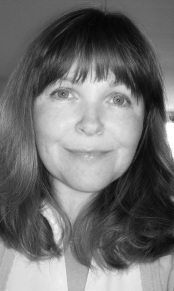 I live with my husband and two sons in Cumbria, England, on the edge of the beautiful Lake District. I never set out to be a writer, although I have always had an insatiable appetite for books.
I live with my husband and two sons in Cumbria, England, on the edge of the beautiful Lake District. I never set out to be a writer, although I have always had an insatiable appetite for books.
Some years ago after leaving an established career in healthcare, I began to research family history, soon becoming fascinated with both World War periods. After completing a degree in English Literature and Creative Writing, I took a walk along a new path, writing from the heart. I write historical fiction and have an obsession with military and aviation history.
My other interests include music, old movies, and photography – especially if WW2 aircraft are on the radar. I am a member of the Historical Novel Society and my debut novel, The Beauty Shop, was released yesterday, 28th November 2016.
Did you read much as a child? Are you an avid reader now? Do you prefer books in your own genre or are you happy to explore others?
As a child, I was an avid reader and can remember at the age of eight, having to go to bed early because of school the next day, and all I wanted to do was read. So, out came the torch and under the duvet I went – I was terrible, but the thing is, it fed my imagination, and I can remember almost as vividly today just how fantastic that felt. Books can give us such a buzz, and I love how you’re so easily transported to another time and place.
I have always been a reader although there were times when work encroached on that, but well before I wandered into writing, I began to read frequently and now it’s a daily routine.
As for genres, well I can quite happily cross those boundaries. It’s quite revelatory as I’m discovering books I wouldn’t have looked at twice years ago. I read contemporary romances, historical fiction, fantasy, thrillers, and crime. I haven’t attempted horror as yet, but then I don’t like watching horror films either so maybe that’s one area that will remain out of bounds.
Are you self-published or traditionally published?
I’m self-published, and it’s been quite a journey. Before I made the decision to do this, I had what I thought was a good grasp on the self-publishing process, but boy was I wrong. What I hadn’t realised was just how much work was involved. It’s relentless and increases the pressure on writing time.
Which genre do you write in and why?
I write historical fiction, which in itself covers all historical periods, but I’m particularly focussed on both World Wars. “The Beauty Shop” is set during the Second World War and I seem to have a natural affinity with this period, although I’m not sure why. About ten years ago I decided to look into my family history which led to some military research, and I subsequently came across so many people, and stories I’d never heard of before, and I was entranced. It became an obsession, and I simply couldn’t walk away. I remember thinking, “Why do I not know about this?” However, the fact is, there is so much information out there and it’s almost impossible to know everything unless of course, you are a historian. My passion for history and for the brave men and women I had encountered led me to write as it seemed sad to leave their stories buried and dishonourable.
Who has been the biggest influence on your writing?
Well, this is always tricky because there are so many, but I’d probably cite Pat Barker, who has written a number of novels, but is perhaps very well known for the Regeneration trilogy, set during the First World War. These books are brilliant, and when I read Ghost Road, I was quite literally ‘blown away.’ The writing is so simple, yet masterful, and I love how Barker weaves fiction seamlessly with real and fictional characters.
I always cite a second author because while Pat Barker had a significant influence, Hilary Mantel had an equally important influence at the very beginning of my writing journey. In her autobiography, “Bringing Up the Bodies” she mentions how she fell into writing. She states how she knew she could write well, but had never written fiction and had to learn. Well, this was revelatory because of the age-old debate about writers and creative writing courses. Can fiction writing be taught? Well, Hilary helped me to see that if you can write then you already have some of the tools to work with. You simply need to embark on the apprenticeship and learn on the job to polish your craft.
Has your country of origin/culture influenced your writing?
I suppose from one perspective it must have. Having been raised in Britain, I’m used to our culture and our historical past and so yes, I feel it does influence and shape the writing. That said, having done an enormous amount of military research, I’m also drawn to other countries, such as America, France, and Germany in pursuit of stories from both World Wars.
What part of the writing process do you find most difficult? How do you overcome it?
I don’t think I can name one thing. Most of the time I just get on and write and it’s great, even if the writing isn’t! However, sometimes I get stuck, and I hit the wall running, and it might just be a bad writing day or it might be a particular character, and I’m uncertain how to advance with him or her. First of all, I listen to music which is therapeutic and helps me create. If that doesn’t work, a little time out and then putting pen to paper and making notes or re-planning usually does the trick. It’s a case of finding something that helps so it’s trial and error. Either way, I’m not usually stuck for long.
Do you have a favourite time of day to write?
Oh yes, absolutely. The best time for me is early morning and late evening, even going beyond midnight. I love it, probably because these are the most peaceful times. During the day it’s disrupting with phone calls, life in general and trying to keep up with marketing and social media.
What is the best thing about being an author? And the flipside – what is the worst?
The best thing is living the dream through the stories you write. I’m writing the books I want to read, and it’s incredible.
The worst thing is spending so much time away from family because of writing pressures and also the fear of failure.
Is social media an essential chore or something you enjoy? Which forum do you prefer?
It’s both. I particularly love Twitter – it’s so easy to reach more people for one thing, and it’s great to meet so many people online all around the world. I love it, even though I’ll admit it’s a struggle to keep up. Facebook is okay, but I’m not as active there simply because I find Twitter easier to navigate and use and it comes down to time. I do use Google Plus and LinkedIn but minimally.
What I have learned is while it might be time-consuming, social media is ideal for advertising you –not just your books, but you as an author and as a person. Speaking from the perspective of a reader, I like to see the person behind the author as it’s interesting and so we can show that side on the various social media platforms. I have conversations on Twitter about lipstick, 1940s fashion, and the Pyramids – it’s such a diverse, interesting and fun arena.
If you weren’t an author, what would you be up to?
I used to be a Midwife, so I’d probably still be bringing new life into the world. I had good times and sad times, and while I still miss it occasionally, it was the right decision to leave, and I’m even happier now I’m on this particular path.
It’s the last day and the earth is facing oblivion – what book would you read?
That’s a tough question now. I’m tempted to say Ghost Road, but Colm Toibin’s Brooklyn is beautiful. I’ve seen the film adaptation which I loved, but the book is far superb.”
Please tell us about your latest published work
My novel, The Beauty Shop is set during World War Two and is a blend of fact and fiction, featuring the real Archibald McIndoe, a New Zealand plastic surgeon who ran a burns unit in East Grinstead, Sussex during the war, appointed by the RAF. He cared for severely 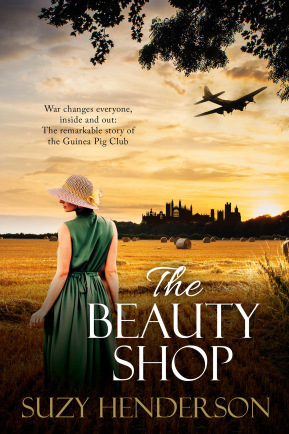 burned airmen and had many unique ideas and rocked the formal establishment just a little. The men he cared for formed a club, known as the Guinea Pig Club and this brotherhood of veterans has been meeting annually ever since its inception in July 1941. Out of 649 members, only 17 remain. Incidentally, 2016 is the 75th anniversary of the Guinea Pig Club.
burned airmen and had many unique ideas and rocked the formal establishment just a little. The men he cared for formed a club, known as the Guinea Pig Club and this brotherhood of veterans has been meeting annually ever since its inception in July 1941. Out of 649 members, only 17 remain. Incidentally, 2016 is the 75th anniversary of the Guinea Pig Club.
The reason this caught my eye around six years ago, was that rather than hide disfigured men away from the public, which was the norm back then, Archie pushed them out into society. He wanted them to live their lives, and to be able to confront the public. Archie felt the public had to get over themselves; they had to learn to see such men if they were ever going to accept them. He was right, and while things are much better today, it’s still not perfect, but I believe the progress that has taken place has its origins rooted in 1939 onwards when Archie’s ‘war work’ began.
In nursing today, students will learn of holistic models of care. Well, Archie’s model of care was perhaps the first holistic model, and it worked. He took severely depressed and sometimes suicidal young men and managed to turn them around. It sounds an exaggeration, but in many cases, he quite literally gave them their lives back, and they lived good lives, thanks to one extraordinary, talented man.
Universal Buy Link for THE BEAUTY SHOP
If you would like to know more about Suzy and her work please check out the links below:
http://www.suzyhendersonauthor.com/
http://lowfellwritersplace.blogspot.co.uk/
https://www.goodreads.com/author/show/15954239.Suzy_Henderson
https://www.facebook.com/SuzyHendersonAuthor/
https://twitter.com/Suzy_Henderson
https://plus.google.com/u/0/109057622139171622985
https://uk.linkedin.com/in/suzy-henderson-714a4353


November 12, 2016
The 19th Century Writing Box
What a joy it is when beauty and function are combined!
On a recent research jaunt into the vaults of the interweb, I discovered what a remarkable collection of items were made to facilitate the Victorians’ love of writing. In particular I was fascinated by their equivalent of the laptop – the lap desk/box or portable escritoire.
The precursor to the writing box was the bible box. As these books were very costly, the box provided a safe way to transport them. Some had a slanted or angled top with a lower lip, meant to hold the Bible for reading, when the box was placed on a table; a type of portable lectern.
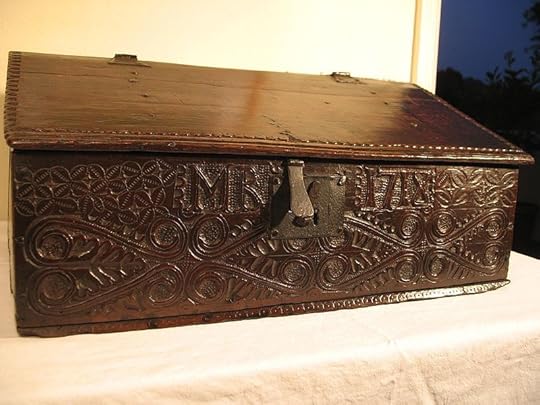
1718 Bible Box
Boxes for holding ink and pens had been in existence for some time but it was during the dying decades of the 18th century that they came into widespread use. Increased travel and war necessitated access to a stable surface to write upon with handy storage for pens, paper and ink. Army officers had their own boxes, using them both for army business and for writing home. Whether you were on a military campaign, writing to your nearest and dearest while on a prolonged sojourn at a country pile, or a young buck off on the Grand Tour, the portable desk became a staple travel accessory. They had to withstand the rough and tumble of strenuous journeys, sometimes strapped to the outside of a coach, exposed to all kinds of weather.
A huge and beautiful selection of all shapes and sizes, have survived and I have to admit to some serious envy.
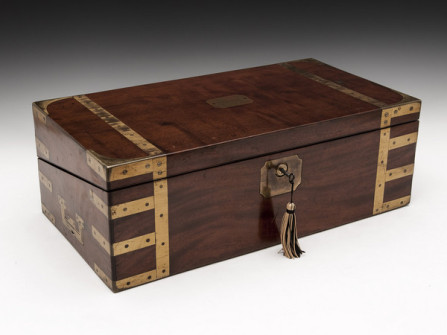
Captain’s Box c. 1810
A Captain’s Writing box was a brass bound box, usually of mahogany. This sample is English, made around 1810. They were made in this shape to make travel easier but when opened contained a sloping writing surface. Compartments for ink, pens and paper where also provided.
Here is a more ornate example of Indian Sandal wood, trimmed in ivory.
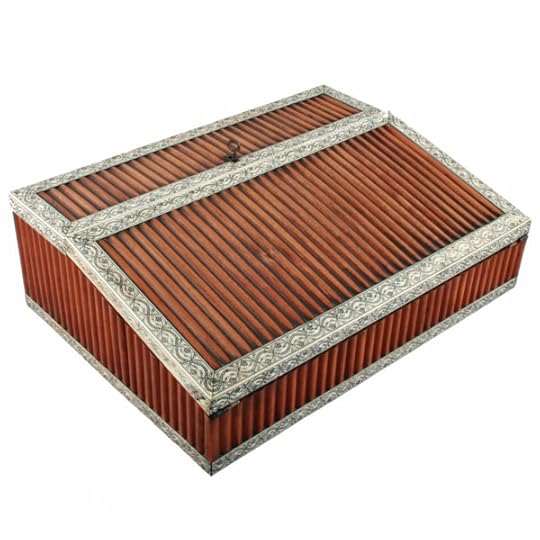
19th Century
The boxes ranged from extremely plain in the early part of the 19th century to those which were more ornate as people exercised their personal taste. Many a famous letter, novel, postcard or dispatch was born on a lap desk. Many a love letter was locked away in a secret compartment too!

Early 19th century examples tended to have thick veneers of mahogany, rosewood, yew or fruitwoods with brass inlays, fine lines or floral swags. Some had fine mother of pearl inlay on the lids and marquetry of naturalistic, neo-classical or geometric designs.
Later examples could be made of mahogany or pine with a thin veneer in walnut, maple, chestnut or rosewood. More expensive boxes had thicker veneers. Brass bindings were glued and secured by small brass studs with the exterior and interior french polished and glossy and secret drawers and compartments were common.
Such a shame that the art of letter writing is disappearing – who wouldn’t want to use one of these?
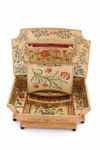
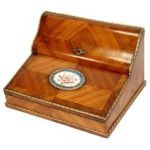


A Conversation with Author Angela Wren
Today in the Library we have Angela Wren, who has dropped in to say hello and to share some insights into her life as an author.
You are very welcome, Angela, please introduce yourself:
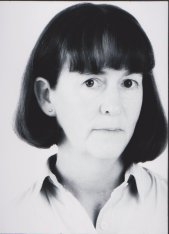 Hello Pam and thanks for inviting me into your fabulous library. You’d better put me on a lead or I may wander and lose myself amongst these fabulous books and shelves!
Hello Pam and thanks for inviting me into your fabulous library. You’d better put me on a lead or I may wander and lose myself amongst these fabulous books and shelves!
I am not only an author but an actor and a theatre director and I am part of the resident company at a small theatre in Yorkshire. I’ve been working on stage since I was only as tall as the dining room table, so I suppose that makes me a ‘died-in-the-wool’ actor. But my ‘pretend life’ is only one half of the story – the bills have to be paid – so, I have also had a career as a Business Change and Project Manager, working in numerous locations across the UK. But I managed to escape so that I could write books.
Did you read much as a child?
Yes. I was reading constantly as a child and I used to make up stories too and loved being read to by my dad at bedtime.
Are you an avid reader now?
Yes, I am. I’ve always read except when I’ve been learning lines for a role. That really is the only time when I never pick up a book. Once the lines are firmly in my head then I make a point of scanning my extensive book shelves for something special.
Do you prefer books in your own genre or are you happy to explore others?
My tastes are very wide and being a collector of books means I can thoroughly indulge my thirst for words. At the moment, I have Willa Cather’s ‘My Mortal Enemy’, a first edition, on my bedside table for my own bedtime reading. A stunning little book that is a little worn – so it has a history – and a little foxed.
I’m reading ‘Dougal’s Diary’ by Sarah Stephenson on the kindle app on my phone, which is ideal for trains and trams. In my brief-case I have a copy of Val McDermid’s ‘Northanger Abbey’ which I’m reading for my book club. I’m looking forward to our debate on the differences and similarities between this book and the original Jane Austen story. On my bookshelves I have most genres covered from the classics to memoire, adventure, mystery, factual, travel, gothic and some romance too.
Are you self-published or traditionally published?
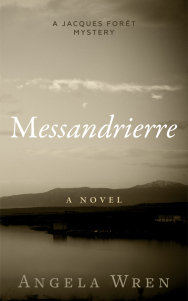 Messandrierre, the first book in my Jacques Forêt series is a mystery and is available in e-format from all the usual outlets and my publisher Crooked Cat. I am also on the brink of self-publishing an anthology of dark fairy tales called ‘Tall Told Tales’. So, very shortly my answer to your question will be ‘both’.
Messandrierre, the first book in my Jacques Forêt series is a mystery and is available in e-format from all the usual outlets and my publisher Crooked Cat. I am also on the brink of self-publishing an anthology of dark fairy tales called ‘Tall Told Tales’. So, very shortly my answer to your question will be ‘both’.
Which genre do you write in and why?
I suppose my primary genre is mystery and I kind of got to that point by accident. I am a member of the Romantic Novelists’ Association and my very first story was a straight romance, set in France. I submitted it to the New Writers’ Scheme and whilst I was waiting for my appraisal to come back I started another story that I knew at the outset was much darker and that I thought might be romantic suspense. As I was writing this second book I found I preferred the crime aspect to the romantic aspect, although the love angle was still there. Three years later, when Messandrierre was ready to be submitted I sought advice and eventually submitted it as a mystery.
Who has been the biggest influence on your writing?
Wow, that’s a really big question. There have been so many influences all through my life. I’ve been learning, reciting and speaking Shakespeare since I was 6 years old. As a teenager I read everything my local library could put on the shelves. Add to that the impact of studying Brecht, Pinero, Miller, Wilde, Bennett, Hare, Ayckbourn, Coward and many more in between for roles I’ve played and I guess you’ve got a vast and meaty stew! How is it possible to pick the choicest pieces from that? I think, all I can say is that my abiding love of words stems from my early understanding of the how the metre and rhythm of our very rich language can work and, I hope some of that comes across in my writing.
Has your country of origin/culture influenced your writing?
My family history is not especially unusual in that I have Irish ancestry on my mum’s side. So, yes I suppose some of that does come through occasionally when I set a story up on the north-west coast where my family originated. In fact, it was a short story written for ‘Ireland’s Own’ magazine that got me my first payment for a published story.
What part of the writing process do you find most difficult? How do you overcome it?
Handling the doubt. I have a voice that mostly sits quietly at the back of my head until she comes forward and starts telling me that this or that plot line just isn’t going to work or, when I’m standing in the wings waiting for my entrance and she’s nagging at me about being able to walk out on that stage. She’s called Nemesis and sometimes she can be a total pain. At other times she can be very destructive, so I have to take myself away from whatever I’m working on and leave it for a few days or a week or so. When I’m in the wings waiting for my cue, I just have to tell her to shut up and focus on my first line.
Do you have a favourite time of day to write?
Not really. I find I think more clearly in the mornings than in the afternoons so I adapt my writing tasks accordingly. But that’s about it.
What is the best thing about being an author? And the flipside – what is the worst?
The creative bit. Having the amazing opportunity to make whatever you want happen – only on paper, of course. As I write mystery, it does mean I think about murder. A lot. So, murder is often a topic of conversation with writing colleagues which can draw some very puzzled looks from other people if you happen to be in a pub or a restaurant. But that’s a minor irritation compared with having a story in your head but not being able to sit at the computer and get it down there and then. I sometimes have to hold a whole story or chapter in m y head for three or four days before I can get to the sanctity of my office at home and get those words on screen.
Is social media an essential chore or something you enjoy? Which forum do you prefer?
I think it is primarily an essential chore for me. If I wasn’t published I wouldn’t even have a presence or if I did it would be minimal and kept to family and close friends only. However, I realise that social media has a significant impact on business and as an author I am actually in business. I try to use my various media accounts to inform and to entertain, so I use them sparingly. I like Twitter for it’s immediacy and Facebook is useful for engaging with readers. But I also write a Blog and I have a website.
If you weren’t an author, what would you be up to?
Travelling in France I should think.
It’s the last day and the earth is facing oblivion – what book would you read?
It has to be the complete works of Shakespeare. No matter how often I’ve recited or read a piece of Shakespeare I always manage to find something new in his writing.
Please tell us what you are working on at the moment.
I’m currently working on the follow-up to Messandrierre. Entitled ‘Merle’, it is also a Jacques Forêt mystery and picks up a few months after the end of Messandrierre. Both books are set in the Cevénnes in the Languedoc-Roussillon region of France.
If you would like to know more about Angela and her work please check out the links below:


October 25, 2016
Family Three – A Short Story
To celebrate The Bowes Inheritance being shortlisted for the Carousel Aware Prize 2016, here is a free short story. A young girl is in trouble and doesn’t know where to turn …
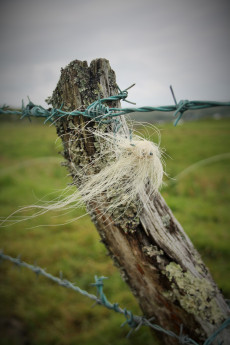
Family Three
Part 1: The Velvet Embrace
I knew Ma was waving goodbye, probably crying too but I was determined not to look. I turned up my iPod and concentrated on the lyrics and the back of the seat in front of me. My breathing slowed and the panic subsided. The bus pulled away from the kerb at Wellington Quay, and I could sense the other passengers relaxing back into their seats and getting lost in their own worlds. I‘m glad they don’t know about mine. Just a schoolgirl, they probably think but that was another life. Now everything has changed. I’ve had a glimpse of the world beyond the school gates.
Exiled to Galway of all places! A year ago I wouldn’t have minded spending time with Aunty Mags but not like this, not with the world all sharp edges. It was going to take ages to get there on the bus, but Ma couldn’t afford the train fare and Dad said it was good enough for me. I shivered. I had always been Dad’s favourite, not that he would admit it in front of Susan or Peter. I just knew. His disappointment was the worst. He wore it like an overcoat, as if he needed to protect himself from me. He’d visited the maternity unit, white as a ghost but he wouldn’t speak to me, just stared at a spot above my head.
“I’ll wait out in the car for ye,” he’d said to Ma. He had turned away and left and I had turned my head to the wall. When Ma was gone, I listened to the babies crying in the next room – other mothers’ babies.
Autumn was busy painting up the landscape and the countryside flew past, mocking me with its lushness, overflowing and ripe. All of a sudden I was glad to be leaving Dublin behind. Everyone else would be going back to school but not me, not yet. They said I needed time to recuperate. I flicked the iPod onto my favourite track and set it to repeat. I concentrated on the passing motorway blandness, watching out for the signs and counting down the kilometres. Aunty Mags had sounded worried on the phone last night and had assured me she’d be waiting at the terminus. She was not like Ma at all. She’d been the wild one, the one who had lived her life as she wanted – never married, independent and strong. Yeah, it would be OK with Mags. She would understand.
Trouble was, I didn’t really understand at all. The social worker had said that I had to move on and not dwell on it; but that was impossible. I couldn’t forget that night, and for as long as I live, I will not be able to forget that searing pain. I thought my body was going to split down the middle – that night I miscarried. I was scared – the blood just kept coming and then Ma came in and the last thing I remembered was her horrified expression before I hit the floor and oblivion. I hadn’t even realised I was pregnant.
Grief. Sometimes I wake in the middle of the night and I wonder about it. Ma said I was lucky the baby had died. What would the likes of me do with a baby anyway … and the disgrace of it. Grief gnawing away but I’m not allowed to feel its velvet embrace, to take comfort in numbness.
“She’s going places, you know,” Ma always says to her cronies. “She’s the brains in this family.” Can’t have the neighbours knowing.
And I wonder did the baby feel. And yes it was a baby – I hate that word ‘foetus’; it makes me think of specimens floating in jars on a laboratory shelf. That tiny life that Paul and I made – did it know its place in the universe before the blackness came?
It’s dark by the time we arrive in Galway. Suddenly I feel unsure. What if Mags judges me too? The tears well up and I feel foolish and lonely and I just sit there, nursing despair.
“Last stop, Miss”, the driver calls out.
And then Aunty Mags appears up the steps. She makes her way towards me. “Come on, love,” she says softly, “we have a bit of a way to go yet.” She smiles and I can see that my fears were unfounded. I fumble with my bag and follow her off the bus, surreptitiously wiping away my tears. She walks ahead, purposeful. It starts to rain and we have to run towards her battered Fiat parked up under a tree. We climb in. The rain bounces off the roof, drumming a tune.
Mags turns to me. “Edel, it will be ok, I promise.” She starts the engine and I begin to hope.
Part 2: Appearances
I hear the door slam. Phil has gone to the pub. I wonder if he has told anyone about our trouble because he certainly hasn’t spoken to me about it. I feel a wave of nausea at the thought of his drinking buddies picking over our private life. I take up the tea towel and dry the plates, slowly and methodically. There is something comforting in routine. I’ve always liked it. From the sitting room I can hear the Coronation Street music – it must be over. I usually watch it but not tonight. Susan is in there on her own but I can’t bear the unspoken questions. There is a void in the house, hovering ghost-like in my peripheral vision. I want to cry.
Mags will look after her. Mags will know the right things to say because I have failed. I shouldn’t have said … it was the shock … and now I can’t take it back and she isn’t here anyway. She’s with Mags on the far side of the country. It might as well be Australia. Susan comes into the kitchen, roots for a biscuit and departs without a word. I clutch the edge of the sink. God, I hate my life! I want to scream it until my voice breaks. Nothing has turned out right. All those foolish dreams. I wanted security, but I didn’t know it would swallow me whole. I’m forty-five and I’ve done nothing and now this.
I go upstairs, away from Susan’s watchful gaze. I hear Peter come in from training and go straight to the kitchen. That boy thinks of nothing but his belly. I close over the bedroom door and sit down on the bed. The clock says nine. She’ll have arrived by now. They will be on their way to Mags’ house. Perhaps there will be comfort there. Edel’s baby – could it even be a baby at six weeks? God, it was awful. The way those ambulance men had looked at me as if it was my fault! If I’d known what was happening I would have driven her to Beaumont Hospital and no one would have been the wiser. Dublin’s so small – someone will have said something to someone. Mrs. McCann looked at me funny yesterday at the chemists.
“Hello Catherine,” said she, but it was the way she said it and the look in her eye. God, they probably all know.
Part 3: A Brush with Life
The rhythmic swish of the wipers was almost hypnotic. Mags felt tired and they still had an hour before they would reach Clifden. She looked across at Edel, wrapped in gloom. God, the poor child – what she has been through and only seventeen. Cath was an idiot, and Phil no better, but could they have made a bigger mess of things? Mags ground the gears in anger. She hoped she would be able to pick up the pieces and help her. Someone had to.
“You know you’re welcome to stay as long as you want,” she said. Edel nodded and turned away to look out into the passing blackness of the night.
Then out of the stillness: “She hates me for the shame I’ve brought on the family.”
Mags was horrified. Spotting the entrance to a field ahead, she pulled the car over. “Darling, that’s madness, she doesn’t hate you. She just doesn’t know how to handle what’s happened. She was never good in a crisis, Cath – usually made things worse.” She reached across and took her niece’s hand and squeezed it, suddenly overcome with emotions she thought she had buried years before. “You must be starving – let’s get home and get you fed.”
Two hours later, Mags was sitting opposite her niece in the warmth of the kitchen. The wind was flinging the rain against the kitchen window with a level of violence not unknown on the west coast. Edel looked up from her steaming mug of tea, her eyes pools of misery.
“I don’t know if it was a boy or a girl. There was a test but Ma wouldn’t pay for it – said it didn’t matter.”
“Oh love, I’m sorry. You had a right to know.”
“I think it was a boy … I hope it was a boy.”
“Why?”
“I don’t like women much – except for you!” Edel blushed and looked even more miserable.
“You’ve had a hard time? Did your friends find out?”
“Yeah, it got out somehow. It was horrible. The things that went up on Facebook … I should have known. I didn’t tell Ma. All she cares about is the neighbours finding out and all that.”
Mags shook her head. “She hasn’t changed but then she was always like our father. He always took the high moral ground. He was a hard man.”
“I don’t remember him,” Edel said with a frown.
“No, you wouldn’t. He died when you were about three. He could be quite cruel.” Mags paused and took a deep breath. “I’d like to tell you something, something private. Your mother doesn’t know and I’d rather she stayed in ignorance.”
“Don’t worry, I won’t tell her.”
“I found myself in a similar position to you. I was a bit older, and I was dating a fellow student in UCD. There was uproar and I was sent down to Aunty Julia in Cork till the baby was born. They made me put him up for adoption. Father said he wouldn’t let me finish college unless I did. What could I do? I pleaded, of course, but I had no money and with no qualifications I wasn’t going to get a decent job. They wore me down. I will always regret it. I should have stood up for myself … and for him.”
Edel twisted her fingers around her mug of tea. “Did you ever look for him?”
Mags nodded. “Yes, he died of scarlet fever when he was five years old.”
“Oh Aunty Mags, I’m so sorry.”
“Well, if there’s a heaven, your little boy and mine are probably together now.”
The wind whistled around the house, making the window rattle. Mags got up and pulled over the curtains.
“Is that why you left Dublin when you qualified?” Edel asked.
Mags leant back against the sink. “Partly. I could never forgive my father. It was just easier to leave and start a new life.”
“Is it possible to be happy again, if you lose your child?”
Mags felt her heart twist. “I’ve known happiness and I have been well loved. There are many who cannot say that. I have learnt not to dwell on the past. You know, your life is only beginning. There may be children in your future or there may not, either way, you owe it to the one you have lost to live the best life you can.”
“Do you think it was my fault?”
“No, my dear. Your baby wasn’t viable. Surely the hospital explained all of this to you?”
“Yes, but you’re a doctor, I want to hear it from you.”
“The reality is that nature is cruel and ruthlessly efficient. It wasn’t meant to be. It’s not some biblical judgement being meted out to you, if that’s the kind of rubbish your mother spouted.”
Edel shrugged.
“It’s purely biology, Edel. The poor little mite probably had something wrong with him. Now, you look exhausted and my bed is certainly calling me. Off you pop!”
Edel stood up. “Yes I am tired.” Then she turned towards her. “I wish you had been my mom.”
Mags swallowed hard. “Thank you.”
Edel’s mobile started to ring. It would be Cath. “I don’t think I want to answer that,” Edel said with a black look towards the vibrating phone.
Mags ushered her out of the room and switched off the light, leaving the phone to ring out in the darkness of the empty kitchen.
The End
©Pam Lecky






